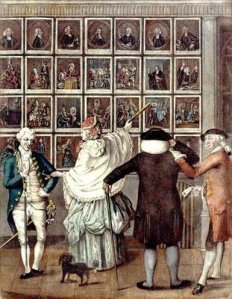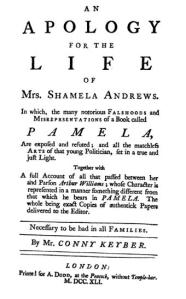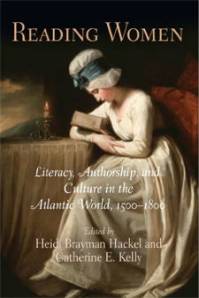A thorough summary of Radcliffe’s import and the context of the Gothic can be found at this professor’s website, and an intersting in-depth exploration here.
More on Ann Radcliffe
Posted in Uncategorized
CFP, Eightenth-Century Fiction
[As posted on C18-L]
Call for Articles: Form & Formalism
Form and Formalism in the British Eighteenth-Century Novel
Special issue of ECF edited by John Richetti
Eighteenth-Century Fiction 24:1 (Fall 2011)
Submission deadline: 31 July 2010
What place for formalism?
Essays are invited for this issue that address one or more of these questions: Is there a place for “formalist” criticism in the study of the eighteenth-century novel? Given the current dominance of historical, thematic, and cultural studies approaches to the eighteenth-century novel, can we usefully speak of novelistic form? Does the novel as a capacious and almost anti-formal “form” leave any space for formalist approaches? Does the sheer variety of narrative types that constitute the novel in the eighteenth century render the notion of “novelistic form” meaningless? Or is there in the period an emerging and dominant formal pattern, a consensus about the properly novelistic form of narrative fiction, that is worth extracting and articulating?
Submit articles online to Digital Commons:
http://digitalcommons.mcmaster.ca/ecf/ choose “Submit Article”
The Editor, Eighteenth-Century Fiction
McMaster University CNH-421, Hamilton, Ontario, Canada, L8S 4L9
tel: 905-525-9140, ext. 27123; fax: 905-777-8316
e-mail: ecf@mcmaster.ca
—
Further details about submitting articles can be found at / Les protocoles de la présentation et de la soumission des articles sont consultables à: http://www.humanities.mcmaster.ca/~ecf/editorialpolicy.html
“Submit Article” at http://digitalcommons.mcmaster.ca/ecf/.
We encourage electronic submissions at Digital Commons (see above), but you may also email submissions to <ecf@mcmaster.ca>.
——————————
Jacqueline Langille, Managing Editor
Eighteenth-Century Fiction
McMaster University, CNH – 421
Hamilton, Ontario, Canada L8S 4L9
Telephone: 905-525-9140, ext. 27123; Fax: 905-777-8316
E-mail: ecf@mcmaster.ca
——————————————————-
Visit the Eighteenth-Century Fiction journal website:
http://www.humanities.mcmaster.ca/~ecf/
Submit to Eighteenth-Century Fiction journal online:
http://digitalcommons.mcmaster.ca/ecf/ “Submit Article”
Check out the ECF journal Facebook group:
http://www.facebook.com/group.php?gid=266102097345
——————————————————-
Posted in journals
18c Women and the “other” economy
Vinny’s comment about English middle class women denying marriage as an economic transaction at a time when other bodies were being shipped across the Atlantic and sold (indeed, to support the relationships of those privileged enough to deny the connection) brought to my mind an interesting C18 novel comment on a similar topic. Here, though, it is the unmarried women, forced to come to grips with her value as a commodity, who makes the connection. In this exchange from Jane Austen’s Emma, the single woman Jane Fairfax discusses the necessity of becoming a governess with the nouveau riche, pretentious Mrs. Elton, who nags her about finding a position:
“But, my dear child, the time is drawing near; here is April, and June, or say even July, is very near, with such business to accomplish before us. Your inexperience really amuses me! A situation such as you deserve, and your friends would require for you, is no every-day occurrence, is not obtained at a moment’s notice; indeed, indeed, we must begin inquiring directly.”
“Excuse me, ma’am, but this is by no means my intention; I make no inquiry myself, and should be sorry to have any made by my friends. When I am quite determined as to the time, I am not at all afraid of being long unemployed. There are places in town, offices, where inquiry would soon produce something, —offices for the sale, not quite of human flesh, but of human intellect.”
“Oh, my dear! human flesh! You quite shock me; if you mean a fling at the slave-trade, I assure you Mr. Suckling was always rather a friend to the abolition.”
“I did not mean, I was not thinking of the slave-trade,” replied Jane; “governess-trade, I assure you, was all that I had in view, —widely different certainly as to the guilt of those who carry it on; but as to the greater misery of the victims, I do not know where it lies. But I only mean to say that there are advertising offices, and that by applying to them I should have no doubt of very soon meeting with something that would do.” (76)
This is typical Austen–teasing us with the topical and transforming it into the personal, her politics always ambiguous. But considering how the governess role resonates across the century–indeed, through to Jane Eyre, a novel about problematic marriages rife with the rhetoric of slavery and liberation—these seem dots worth connecting.
Posted in Uncategorized
Economic (Wo)Man
Just to follow up on the question about women’s role in the new economy of the 18c, here’s some suggested reading:
Catherine Gallagher, Nobody’s Story: The Vanishing Acts of Women Writers in the Marketplace, 1670-1820 (1994)
Catherine Ingrassia, Authorship, Commerce, and Gender in Early Eighteenth-Century England: a Culture of Paper Credit (1998).
Elizabeth Kowaleski-Wallace, Consuming Subjects: Women, Shopping, and Business in the Eighteenth Century (1997)
Erin Mackie, Market a la Mode: Fashion, Commodity, and Gender in the Tatler and the Spectator (1997)
A nice collection of conduct literature of the period can be found in Vivien Jones, Women in the Eighteenth Century: Constructions of Femininity (1990)
While these all concern representations of women, there’s also lots of research on the actual work that women did, such as:


Alice Clark, Working Life of Women in the Seventeenth Century (1968)
Bridget Hill, Women, Work, and Sexual Politics in Eighteenth-Century England (1994)
Paula McDowell, The Women of Grub Street: Press, Politics, and Gender in the London Literary Landscape, 1678-1730 (1998) [essential reading on women and print culture]
There’s lots more, of course, but these should get you started! Please comment if you have others on your must-read list.
Posted in books
A detailed reading of Shamela
…with all its puns, references, double entendres, and layers of layers of meanings, can be found in “The Framework of Shamela” by Eric Rothstein, ELH, Vol. 35, No. 3 (Sep., 1968), pp. 381-40 (which you can access via JStor). The details help one understand the multiple targets Fielding was satirizing, which in turn reveal how intertwined the novel, sexual politics and governmental affairs really were–at least for a careful reader of culture like Fielding.
DeRoy Lecture at Wayne State
The 2009-2010 DeRoy Lectures and the Working Group on Science and Society present:
What’s Wrong with Literary Darwinism
and How to Fix It
William Flesch
(Professor of English, Brandeis University)
Friday, February 12, 2010, 3:30 pm
Wayne State Humanities Center
2339 Faculty/Administration Building
In Comeuppance: A Natural History of Our Interest in Narrative (2007), Flesch uses game theory and evolutionary psychology to explain why people find pleasure in both the happy and tragic lives of fictional characters. Evolutionary biologists have failed to explain why people have powerful emotional reactions to imaginary tales, he believes, because they don’t understand how narrative works. “We evolved so that we punish cheaters, take pleasure in punishing cheaters, and take pleasure in watching others punish cheaters. It is that kind of pleasurable interest that we also take in literature.”
William Flesch is Professor of English and Comparative Literature at Brandeis University, where he also teaches film and sometimes philosophy. He is the author of Generosity and the Limits of Authority: Shakespeare, Herbert, Milton; of Comeuppance; and of The Facts on File Companion to 19th Century British Poetry. He has published articles in ELH, Critical Inquiry, and elsewhere. He is now working on a sequel to Comeuppance, about Decision Theory and Narrative, as well as a History of English Poetic Form from Beowulf through the First World War.
Posted in Uncategorized
Not a novel but…
…speaking of the early 18th century, here’s a rap version of Swift’s “A Modest Proposal.” I love this!
Posted in Uncategorized
Just ordered via MelCat…
The Self and It:
Novel Objects in Eighteenth-Century England
by Julie Park
You can access a good preview on the Stanford University Press.
Posted in Links
Another WSU conference opportunity
“Merriment, Mayhem and Masquerade?”–sounds like Love in Excess!
Call For Papers
8th Annual Graduate Student Conference
Conference Theme: Carnival; Merriment, Mayhem and Masquerade
Guest Speaker: Tom Conley
Professor Conley is the Abbott Lawrence Lowell Professor of Romance Languages and Literatures and Chair of Visual and Environmental Studies at Harvard University.
Sponsored by the Classical and Modern Languages Graduate Forum
Wayne State University
Department of Classical and Modern Languages, Literatures, and Cultures
Conference Date: Saturday, April 3, 2010
Submission Deadline for Abstracts: Friday, February 12th , 2010
From Brazil to Venice, from the ancient forum to Bourbon Street, festival time ushers in a period of merriment and mayhem. Often during these periods of celebration normal social codes are suspended or reversed. What are the important roles that these festivals play within a culture and how does their universality among cultures speak to the human condition? Come and explore Carnivals around the world and throughout history.
Abstracts for 20 minute papers are welcome. Topics include but are not limited to….
Carnivals across the World • Saturnalia • Banqueting, • Circuses • Festival Culture• the Grotesque • Masks • Bahktin • Commedia del’ Arte • Racial, Ethnic and Linguistic Identity • Colonization • Syncretism • Cross-dressing • Social and Sexual Transgression • Costumes • Pageantry •
…………………………………
Submission Criteria
1. Abstracts and papers must be in English.
2. Abstracts must not exceed 200 words.
3. Abstracts must contain the following information: name of presenter, affiliation and status, mailing address, e-mail address, title of paper.
4. Presentation time limit 20 minutes (8 page maximum).
Posted in conference, Uncategorized
New Book
Not exactly on novels per se, but pertinent nonetheless:
“Reading Women brings into conversation the latest scholarship by early modernists and early Americanists on the role of gender in the production and consumption of texts during this expansion of female readership. Drawing together historians and literary scholars, the essays share a concern with local specificity and material culture. Removing women from the historically inaccurate frame of exclusively solitary, silent reading, the authors collectively return their subjects to the activities that so often coincided with reading: shopping, sewing, talking, writing, performing, and collecting. With chapters on samplers, storytelling, testimony, and translation, the volume expands notions of reading and literacy, and it insists upon a rich and varied narrative that crosses disciplinary boundaries and national borders.” More information.


Posted in books




